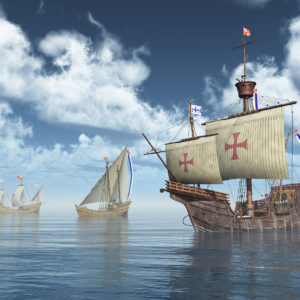Columbus Day, which commemorates Christopher Columbus’ arrival in the “New World” on Oct. 12, 1492, is one of 10 federal holidays, observed on the second Monday of October (October 10 this year). The first observance of Columbus Day is said to have occurred in 1792; it became a legal holiday 100 years later, in 1892.
The quiz below, from the Ashbrook Center at Ashland University in Ohio, provides an opportunity for you to test your knowledge of Columbus and other explorers who ventured into the unknown and changed the course of history.
1. When Christopher Columbus died in 1506, he still believed that his 1492 voyage had led him from the “Old World” to what other part of the world?
A. Africa
B. America
C. Asia
D. Australia
2. What country sponsored Christopher Columbus’ original voyage?
A. Italy
B. Spain
C. England
D. Portugal
3. Columbus left a contingent of men to build a settlement in what current-day country?
A. Haiti
B. Bahamas
C. Cuba
D. Jamaica
4. How many times did Columbus return to the Americas after his initial voyage?
A. One
B. Two
C. Three
D. Four
5. What present-day country did Christopher Columbus not explore on his voyages?
A. United States
B. Mexico
C. Honduras
D. Venezuela
6. In Columbus’ journal, he writes that the goal of his voyage was to:
A. Convert people to Catholicism
B. Find a quicker trade route
C. Discover gold
D. Expand Spain’s territory
7. In his first letter to the king and queen after his return to Europe, what did he note that the native people lacked?
A. Gold
B. Ships
C. Religion
D. Weapons
8. Which of the following was not an early explorer of the Americas?
A. John Cabot
B. Ferdinand Magellan
C. Vasco de Gama
D. Hernan Cortes
9. Which explorer discovered present-day Florida?
A. Francisco Pizarro
B. Juan Ponce de Leon
C. Marco Polo
D. John Cabot
10. Who was the first known explorer of the Chesapeake Bay?
A. James Cook
B. Francis Drake
C. Hernando de Soto
D. John Smith
Answers:
1-C, 2-B, 3-A, 4-C, 5-A, 6-A, 7-D, 8-C, 9-B, 10-D

